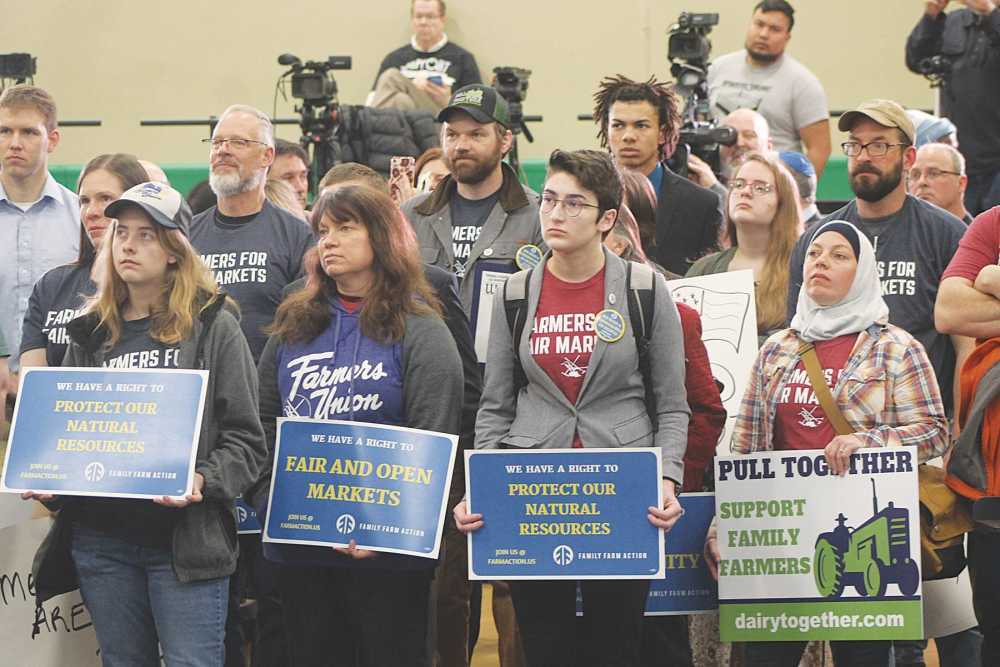Following the “Get Big or Get Out” policies of the 1980s, our nation’s rural communities have been devastated by consolidation and the dominance of industrial agriculture. It has resulted in the extraction of the wealth of rural communities and widespread loss of population. This market consolidation has only amplified the historic systemic discrimination that is entrenched in the food and agriculture systems. We are calling on elected officials in Washington D.C. and state capitols across the country to pledge reforms guided by our Farmers Bill of Rights. It’s time to revitalize our rural communities and end discrimination by investing in family farmers and small businesses that respect the land, animals, and their neighbors.
Our Farmers Bill of Rights was introduced in the House of Representatives by Rep. Deb Haaland (D-NM-01) and Rep. Chellie Pingree (D-ME-01), and the U.S. Senate by Sen. Cory Booker (D-NJ).

1. RIGHT TO FAIR, OPEN MARKETS
There must be a competitive open marketplace to buy seeds, fertilizer, and other goods, and to sell produce, livestock, and meat for all people. It has become nearly impossible for independent farmers, processors, seed suppliers, mechanics, and other rural businesses to compete with multinational monopolies. Farmers need strong antitrust safeguards.
2. RIGHT TO FEED THEIR COMMUNITY
Multinational corporations have taken control of the country’s food system by shutting out independent processing and distribution businesses, consequentially locking farmers out of their local markets and denying domestic consumers local, regional, and culturally traditional foods. In the United States, Native Americans suffer from the highest rates of food insecurity with African Americans and Hispanic communities more food insecure than the national average, which could be remedied through investment in local food systems, greater regulatory flexibility, and Tribal self-governance programs.
3. RIGHT TO FAIR CAPITAL
With the loss of community and regional banks, coupled with the extraction of wealth from rural communities by large corporations, farmers and local businesses cannot access the capital necessary to operate. Congress must ensure that all farmers, regardless of background, can access the credit and capital they need. This includes Native American producers and Tribal agricultural enterprises that often must contract with Federal agencies for resources, and African-American farmers who have endured historical discrimination accessing farm credit.
4. RIGHT TO PROTECT NATURAL RESOURCES
If large corporations want to purchase land and operate megafarms, they have a duty to protect the Earth’s soil, water, and natural resources, as rural and indigenous farmers have for generations. Corporate megafarms have a duty to support conservation by following reasonable standards for aquifer use, manure storage, and other land-use guidelines. Preserving land-based agricultural resources is vital to beginning to mitigate the impacts of climate change and preserve natural resources for both the tradition of diversified rural family farming and the cultural sustainability of indigenous agricultural communities.
5. RIGHT TO LOCAL LAND CONTROL, PROPERTY RIGHTS, AND PROTECTION OF TRIBAL LANDS AND SOVEREIGNTY
Counties and other local governments should have the ability to pass and enforce ordinances regulating the size, placement, and scope of megafarms to protect the value of rural family farmers’ land and the surrounding environment. African-American farmers and other historically underserved farmers and ranchers should retain their land ownership and rights. Tribal Governments are sovereign nations with the inherent right to independently control their lands through self-governance programs to safeguard traditional foods and medicines for their citizens’ wellbeing and preservation of ceremonial practices of American Indian and Alaska Natives, including the expansion of historically diminished indigenous hunting, fishing, and gathering rights.
6. RIGHT TO FOOD SECURITY
Foreign ownership hurts family farmers and ranchers and raises national security concerns. A strict cap on foreign ownership of farms, farmland, and agribusinesses should be set to ensure that all American farmers can access domestic farmland.
7. RIGHT TO REPAIR
Huge corporations and their Wall Street backers have gone so far as to prevent local businesses and farmers from fixing their own tractors and equipment, forcing them to pay corporate technicians to make all repairs. A farmer should have the right to fix their own equipment as they see fit.
8. RIGHT TO TRANSPARENT LABELING
A farmer should be able to label their food accurately and transparently—including strong country of origin labeling standards.
9. RIGHT TO RURAL OPPORTUNITY
Monopolies have hollowed out local economies and taken away the traditional pathways of opportunity for free enterprise that helped communities thrive. No farmer should have to choose between continuing to operate their farm and getting access to good schools and health care. No farmer should have to choose between farming and providing a future for their children. Farmers need the right to basic services in rural communities.
10. RIGHT TO PRESERVE A DIVERSE COMMUNITY OF FARMERS AND FARMING PRACTICES
For too long, historically underserved farmers and ranchers have lacked a voice on local and national agricultural policies and development. Congress must ensure that historically underserved farmers and ranchers have fair opportunities in the market, a seat at the table in policy development, access to culturally relevant training and technical assistance, and equal treatment by all Federal agencies.